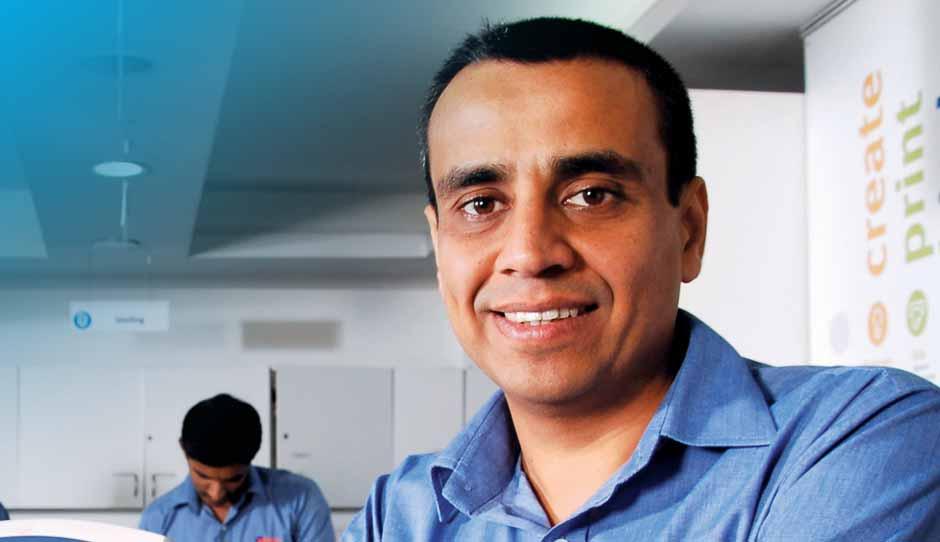Following Rules is My Achilles’ Heel: Manish Sharma of Printo
- BY Sonal Khetarpal
 In People
In People 17388
17388 0
0

Manish Sharma describes himself as a serial entrepreneur—at least till he met his business partner and wife Lalana Zaveri. Post-marriage, they drifted for a while, before founding their own venture: Printo, a branded retail chain that provides digital printing services. With Printo, it seems, both also found true love. The Rs 19-crore company with several outlets in Tamil Nadu and Karnataka has won both admirers and customers. Among them are Sequoia Capital and Seedfund who put in $4.2 million in early-stage capital. The man at the helm of affairs at Printo takes us behind the sweat and grit of the building blocks of his business—the ethics, work culture and management style.
I am a marathon runner, and my morning schedule is dictated by this singular fact. I wake up early—between 5.30 and 5.45am—for a practice run every morning. On a weekday I run less than 25 kms, but on Sundays we try to cover longer distances. I say “we” because that’s how runners talk. I did coach a group of fellow enthusiasts along with three other guys. Last year, I took a sabbatical from the “we” to concentrate more on the “me”. But I have my fast friends (no pun intended) and we often run together. I practice for an hour-and-a-half daily with a bit of weights, which, honestly, I hate. All that weight training and running leaves me famished by 7.30am, by when I am home and devouring poached or fried eggs, cereal and milk or a sandwich—I am not too strict about breakfast.
Ideally, I like to step through the office doors by 7.45am. That doesn’t happen every day. But I am there by 8.15am. My partner in business and in life, Lalana Zaveri, gets to the office 45 minutes later. She is more of a night person and gets up later. She has her breakfast on the fly.
I must arrive at the office at least half-an-hour before everyone else, including her. On days when I am late, I am grumpy. I mean, really grumpy. I usually cycle to work and take a shower in office so that I can save time. Biking helps me reach office (almost eight kilometres away) in 25 minutes, while a drive takes anywhere between 25 and 45 minutes. My bike was recently stolen, so now I have to buy a new one. Because I don’t have a long drive, I don’t listen to the radio. At the risk of sounding strange, I do talk to myself and think aloud.
When I am home, as a discipline, I don’t respond to e-mails straightaway. Everyone knows that. So if it is really important, I receive an SMS. I believe that sometimes mobiles (I don’t own a BlackBerry) and e-mails are unwanted interruptions. I do answer mails in office right after I have had my coffee. There’s a small area in office that doubles up as kitchen-cum-pantry where I make a strong cup of black coffee before starting my Mac. It’s typically around 8.30am that I am diving into e-mails, catching up on pending work and generally taking stock of the day.
Ours is an open office. As a result, employees approach me (or any member of the management team) for discussions at any given time—those interactions often roll into major meetings. Management meetings don't usually start before 9am. I usually have around four, 45-minute-long meetings every day. Once a month, we have a monthly retail kick-off which starts at 8am and runs longer. It’s attended by the entire team. Apart from this, there’s a meeting every three to four days in the week. We meet when there’s something to say, discuss or talk about: otherwise there’s no point in such exercises. However, on most days there are things to talk about with the management team: which comprises the co-founder, CIO and the president-cum-COO. Our COO joined us this year and the joining was serendipitous. I had been on the look out for the “perfect person” when a member of my running group spoke about a former IIM batchmate who’d returned to his hometown—Bengaluru—after a stint in the States. He said I should meet him. I did. Found that the man in question had a “Bombay bias”. I think I broke it and some days later he agreed to come on board. My running paid off for the company, as well!
Following rules is my Achilles’ Heel. I’m thrilled to delegate.” –Manish Sharma, Printo
Coming back to the day, there’s a finance meeting every week that goes on for an hour or so. As a rule, we try to make the company finances available to everyone involved: we have designed processes in such a way that every person has access to store margins. We believe that at a unit level, every store member should know the store numbers and profitability—they should be aware of which store is not doing well and why not. In the past, I have interviewed people who were not aware of their company or store revenues. I find that strange. A company’s like a team. People should know the scores, who’s playing what and how well, and then decide how he or she can pitch in. My partner and I try to keep a sense of “being in this together”. Therefore, meetings happen in this small room with one large table. We all sit around it, throw ideas around and talk to each other across the table. It’s informal and productive.
Luckily for me, my part in all this—as the CEO—is just to show up. I am pretty good at showing up and wish to continue doing that for a while. Jokes apart, administration and finances are not my strengths. My partner and I recently had this talk about “responsibilities”. I believe my strength lies in innovating, ideating and process designing. Secondly, I do enjoy creating new opportunities—a new store or a product. I am good at fire fighting and in starting processes which are creative for me. It’s also fun trying to find the right person for the right role, and putting together departments. Getting these in place makes it worthwhile for me.
But following rules is my Achilles’ heel. Unlike the so-called “typical” entrepreneurship pangs of handing over the reigns, I was thrilled to delegate responsibility and let someone else follow the rules. I don’t believe I make a very good team worker: I believe that entrepreneurs don’t realise that they aren’t good team players at all, though they can put together a killer team. They might believe that they are leading an organisation, but on a day-to-day basis, it’s usually a group of very competent managers who run the affairs. That’s the truth.
What I love about my job is the lack of routine: I spend a day every week visiting stores and meeting customers, keeping my ears on the ground. I have a lot of energy for meeting new people. It is a perfect way to keep the feedback coming and to interact with our managers. Our business is spread over a wide area. It’s difficult to keep in touch with every member of the team, all the time. Once a month, I visit stores to either attend an event or just for a chat over chai or coffee. I may not be deeply involved in recruiting all managers and employees, but my partner and I are a part of the training and induction sessions—always. If I am in town, then I make it a point to be part of the training process. I don’t care about the number of people at the session—could be two or 20—the point is to explain the office culture, work ethics and company vision. Till there’s clarity on that, it’s no use working for and with an organisation, is there? We also resort to role-plays during sessions, especially when we launch a new product, and need to figure out a new strategy. Role-playing or going through case studies remind me of my MBA days.
Our office has a distinct atmosphere—it’s the opposite of what I call the hierarchical “cabin culture”. Though we operate pretty much like a traditional manufacturing set-up, at the same time it’s an open office. Traditionally, we have a uniform, right from the CEO to a factory employee, every one wears the same shirt and pants to the office—colours may vary.
We all eat lunch in the office’s subsidised canteen. Before we started the canteen, we all ate at roadside Darshinees that dot Bengaluru, especially its industrial areas. I loathed the food and hated paying for it. That got us thinking: how badly our employees were eating. However, that’s where the similarity ends. We believe in the dignity of labour. I believe there is little respect for the working-class people in my country. Every employee plays an important part in his or her company. So, we try to stress on stuff that offices don't usually talk about, but impacts a worker’s life: diet, hygiene, discipline and ethics—both inside and outside office. We do try to enforce discipline (which makes us traditional, I guess). But, if anybody puts a comment or query on our website, my partner will get back to him or her within half-an-hour. Any question, comment posted on the website between 8am to 9pm definitely elicits a response from someone—Lalana, the head of city operations, any member of the management team or I. These past four days, while Lalana’s been in training, I have been fielding calls. Because she looks after retail operationally, she’s really focused on feedback. The hands-on approach is possible because I don’t have to travel much for work. I realised that when I went to an alumni meet recently. I was listening to my former classmates talk about their travels, which takes them across the globe, leaving little time to tackle day-to-day issues. I had to point out, if I go beyond 20 miles, I am out of my market.
I was only kidding, because now we have a store in Hyderabad too. Fortunately, I am in the thick of things for most part of the year. Work-related travel consists of 10 days, at the most.
We are in the retail business: it’s standing on your two feet for better part of the day, or rush, rush, rush. In such a work life, lunches are 20-minute affairs. Interestingly, we barely talk shop during lunches. It’s usually about family, kids, school and cinema. The period post-lunch is equally hectic. Meetings start from 2.30pm. Our headquarters are known not as the head office but as the main support office—post-lunch we are quickly back to meetings and checking feedback e-mails.
My office and work end at 7.45pm. By the time I am on my way back, I am already chatting with a friend, catching up. Work might be on my mind, but I don’t go home and check e-mails. I would rather sleep early and put in an hour’s work before hitting the gym in the morning than work late. Lalana, on the other hand, prefers to take her work home, to bed or bath—wherever she can. We are completely opposite personalities. She’s extremely reactive. To be fair to her, I think as the head of retail, she needs to be reactive and mirror customers’ emotions. She and retail managers are the only sets of people who are allowed to interrupt meetings to receive telephone calls and leave the conference room. Customers come before everything else.
Lalana’s work and personal life are completely integrated. When she works, she’s very happy, cracking jokes: as if work’s a picnic. Sometimes it irks me that she keeps so busy. Often she gets irritated when I completely switch off. I don’t recommend that people do business with their spouses. Lalana thinks it’s a great idea. We are such different personalities. At first it was a difficult process adjusting to the work-home routine. Today, we have learnt to come to a consensus. I don’t remember the last time when we quarrelled over home issues, but we fight over work, and often. She comes from a business family, so her approach is distinctly different from mine. I think women business leaders are smarter and their thoughts are sorted. So, it’s me who had to back down a bit and learn to co-operate, rather than her.
One of the several consensuses that we reached together was to introduce a five-day week. We will get the system in place by this month-end or the next. So far, we have managed to give all our workers two Saturdays off every month. On most Saturdays, Lalana and I are working. Once in a while, we take off to the hills or go out of the city for a 14-day annual holiday. One of our breaks, we take as individuals. I was wary of the idea: but now I see the wisdom in it. We both love the outdoors. But, I prefer long treks and she prefers shorter ones. For some reason (she calls it sanity) she prefers shorter marathons, while I like the Ultras. Instead of us both compromising, we decided to do our own thing once a year. Apart from the common holidays, watching theatre, meeting friends and reading helps us unwind. I have recently been smitten by historical tomes. As has she. Either I read and then turn in or we cook dinner together and try to have one meal together, before I turn off the lights by 10.30pm. Tomorrow’s another big day.





























Add new comment